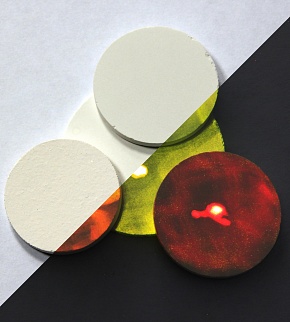UV- and IR-radiation visualizers
"RPF “Luminophor” Corp." has been specializing for more than 50 years in the developments and production of luminescent materials for different purposes including luminescent materials (phosphors) converting laser ultra-violet (UV) and infra-red (IR) emission into visible light, and IR-emission in the short wavelength range into longer wavelength range and inversely. Recently our specialists have developed the luminescing compositions visualizing and detecting laser emission and also the detecting devices on their base. Visualizators are manufactured by the Technical Specification (TY) 20.59.52-079-48591565-2021.
Characteristics
| Visualizer type |
Spectral range, nm |
Variants of emission colour |
Peculiarities |
|
IKV-G IKV-3M NEW! IKV-R IKV-Y |
900-1085 800-1600 900-1085 1400-1600 |
Green Green Red Yellow |
Don’t need additional pumping ("charging") |
|
IKV-VK IKV-VR |
750-1750 750-2100 |
Red Red |
Additional irradiation (pumping) by the wavelength of 200-280 nm or 450-470 nm or white daylight is necessary |
|
UFV-G UFV-Y UFV-R UFV-B |
250-380 280-500 250-550 250-380 |
Green Yellow Red Blue |
Don’t need additional pumping ("charging") |
1. As cards made from solid plastic:
-
size of detection active area is 25×50 mm;
-
wide spectral range of visualization is 250-2100 nm;
-
sensitivity is up to 1 mW/mm2.
2. As a disk:
-
diameter is 32 or 42 mm;
-
wide spectral range of visualization is 250-2100 nm;
-
sensitivity is up to 1 mW/mm2.
-
diameter is 32 or 42 mm;
-
wide spectral range of visualization is 250-2100 nm;
-
sensitivity is up to 1 mW/mm2.
It is possible to produce various visualizer cards by individual requests.
Application:
-
for detecting UV and IR-emission of such sources as Nd:YAG lasers, laser diodes and He-Ne lasers;
-
for visual estimating the space distribution of laser radiation;
-
or visualization of radiation both from a pulsed laser and a continuous wave laser;
-
for laser alignment, functional testing of lasers.
Advantages
Due to the high conversion efficiency of radiation, these visualizers can be used in the standard illumination conditions. There are types which do not need “precharging” with any light source (for example, infrared or ultraviolet).
Operation condition
The requirements of laser safety must be strictly observed when working with it.




